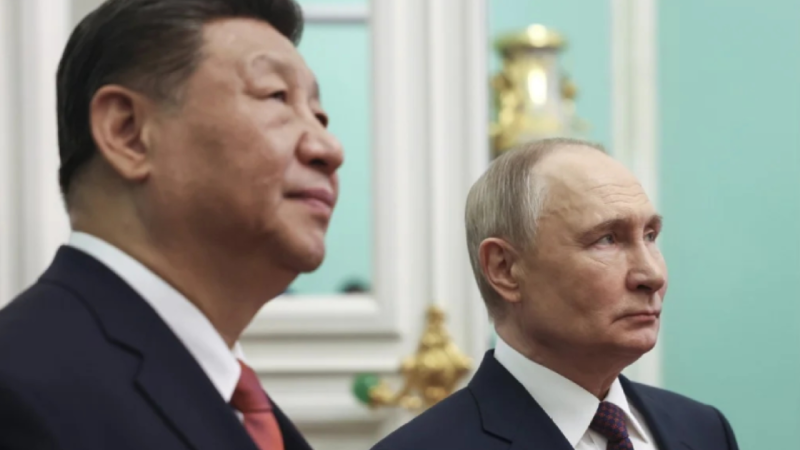Zhao Long Interviewed by South China Morning Post
Zhao Long source:South China Morning Post
source:South China Morning Post
The presidents of the two countries take aim at the US and its allies, accusing them of undermining peace and stability
China and Russia have formed a unified front against the United States in a rebuff to speculation that US President Donald Trump could divide the two neighbours.
After talks between Chinese President Xi Jinping and his Russian counterpart Vladimir Putin in Moscow on Thursday, the two countries slammed the “hegemony” and “unilateralism” of Trump’s America-centric foreign policy to shake up the global order.
Observers said the two leaders, who attended commemorations in the Russian capital of the 80th anniversary of Nazi Germany’s surrender to the Soviet Union, were seeking to present their countries as on the right side of history and justice – in contrast to the US.
Since returning to office, Trump has launched a global tariff war, withdrawn from the Paris Climate Accord, and repeatedly attacked multilateral institutions established since the second world war.
His policies have alienated both allies and adversaries, fuelling fears of a fragmented world and a weakened global economy and security landscape.
In a joint statement, China and Russia declared that the global trend was towards a “more equitable and sustainable multipolar world order” – one they were committed to advancing alongside the rest of the world.
“Some countries are obsessed with hegemony and neo-colonialism, abusing aggressive policies, restricting other countries’ sovereignty, and curbing other countries’ economic and technological development in order to protect their own privileges,” the statement said.
“This is not in line with the trend of the times towards a multipolar world.
“As independent forces in building a multipolar world, both sides will fully tap bilateral potential, safeguard the international system with the United Nations at its core, uphold basic norms based on the UN Charter, and promote a more just and reasonable global order.”
The two countries then took aim at the US and “its allies” for adopting hostile policies, smearing China-Russia cooperation and containing both countries. Beijing and Moscow would jointly counter the US policy of “dual containment” against them.
They accused the US and various members of the West of promoting “exclusive small circles” in the Asia-Pacific, a clear reference to the Aukus and the Quad alliances, warning that such moves “undermine regional peace, stability, and prosperity” in the region.
They also hit out at the US Indo-Pacific strategy, including nuclear-sharing arrangements with allies and deployment of tactical weapons in the region.
Victor Gao, vice-president of the Centre for China and Globalisation, said the joint message stressed that the post-war order was intended to be UN-centred and multipolar – rather than US-led.
He said China and Russia were increasingly aligned to resist US “bullying” and to work with the broader international community.
“[China and Russia] are determined to … strive for fairer development opportunities for both themselves and the rest of the world,” he said.
Wang Yiwei, an international relations professor at Renmin University, agreed that the statements aimed to reassert a “correct narrative” of World War II and the post-war system.
“It’s not that because you designed the UN [system], you can dominate the world,” Wang said. “The US always thinks it’s being taken advantage of … but its actions run counter to the UN’s core values.”
The growing China-Russia alignment was reflected in the more than 20 bilateral documents signed on Thursday, covering cooperation in areas such as energy, the economy, high technology and defence.
Gao said China-Russia ties were at an “unprecedented” level and their united front on Victory Day countered the “reverse Nixon” idea pushed by some in Trump’s circle.
The theory refers to then US president Richard Nixon’s 1972 Cold War policy to contain the Soviet Union by engaging China.
Eager to broker a Ukraine peace deal, the US president has made overtures to Russia, with some in his cabinet proposing a ceasefire plan that includes Ukraine giving up territory and dropping its Nato bid. The pro-Russia tilt is seen as an attempt to pull Moscow closer to Washington.
But Trump, Gao argued, “miscalculated” in thinking he could drive a wedge between Russia and China.
The joint statement also condemned “unilateral sanctions”, in an apparent reference to Russia’s economic isolation in the aftermath of the Ukraine war, a conflict that Beijing has offered to help mediate.
The US and Europe have united in criticising China’s position on the Ukraine war. Although China positions itself as neutral, it has been accused of aiding Russia’s war effort through increased trade, including the export of dual-use goods – accusations China denies.
Zhao Long, a China-Russia relations expert at the Shanghai Institutes for International Studies, said Xi and Putin aimed to inject “stability” into a “chaotic” international environment fuelled by Trump’s tariff war.
“Many developing and Global South countries support multilateralism and the UN-centred international system and are beneficiaries of economic globalisation, but fall as victims of the tariff war,” Zhao said. “The united voice of China and Russia offers some stability.”


